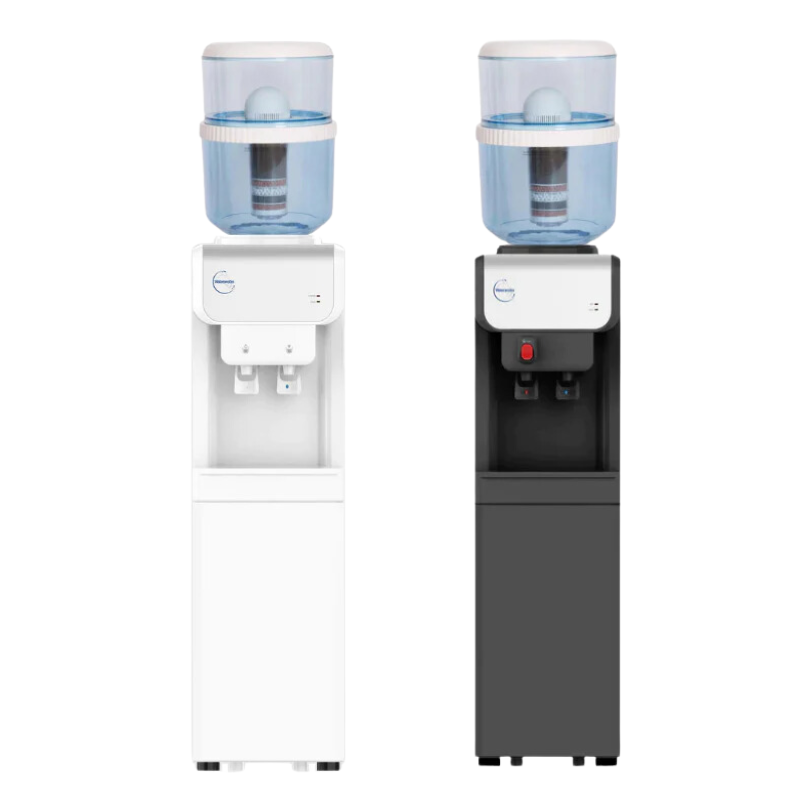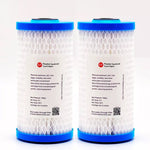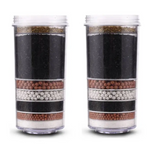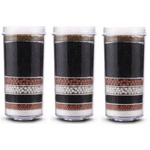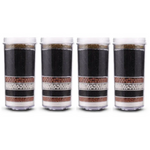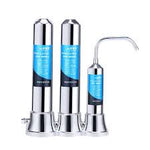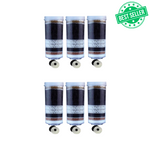You have no items in your shopping cart.
Ceramic water filters are versatile water filtration that removes germs and sediment from drinking water using natural media. Ceramic filters are available in various configurations, from under-sink installations for point-of-use consumption to portable filters you can take on camping vacations to keep you hydrated. These are popular options due to their low cost, long lifespan, and excellent filtration capabilities. But do ceramic water filters remove fluoride from your tap water?
CERAMIC FILTERS
Ceramic water filters are one of the earliest types of water filtration accessible. In 1827, inventor and potter Henry Doulton discovered that filtering water with porous ceramic media eradicated waterborne diseases such as cholera from drinking water. For Queen Victoria, Doulton created a royal gravity-fed water filter that combined the elegance of hand-crafted ceramics with his pioneering water filtration technology. Ceramic water filters have been a fixture of the market since then.
Ceramic water filters are a type of filter that removes everything from sediment to germs to lead from your drinking water using media with small particle size. Modern ceramic filters frequently include different filtration media within the ceramic shell's walls for added contaminant removal. Granular activated carbon, carbon blocks, and unique mineral mixtures are examples of this.
One of the most cost-effective filtration options is a ceramic filtration system. The cost of a complete point-of-use ceramic (POU) system ranges from $100 to $200. It's a more environmentally responsible alternative to bottled water. Plus, it's also significantly more affordable than other filtering systems. You can clean and reuse ceramic filters, reducing the number of filters that need replacement. The gravity-fed versions are small and run without electricity.
DO CERAMIC WATER FILTERS REMOVE FLUORIDE?
You can reduce fluoride by using a ceramic water filter system. There are some good gravity water filters with ceramic filters that can remove fluoride as well. These make it easier for the water to drain through a ceramic filter via gravity.
When it comes to fluoride removal, they can be even more effective than RO systems. The fluoride concentration of your water reduces by at least 97 percent in some models. They're also cheaper than RO systems, despite the fact that they don't remove as many pollutants.
Because they're sluggish, they are also ideal for tiny households with modest water demand. If you can live on 5 to 9 liters of water each day, they could be a viable option.
HOW DOES IT WORK
Mechanical filtration, in which the filter serves as a sieve, is how ceramic filters operate. It will stop any particle larger than the pore size of the ceramic filter surface as water passes through it.
Ceramic water filters can minimize or eliminate tiny impurities such as silt, protozoa, microbial cysts (giardia, cryptosporidium, and bacteria) due to their narrow pores. Ceramic filtration, on the other hand, is ineffective against viruses on its own.
Most use silver in several ceramic filters to kill or incapacitate germs. The presence of silver in the filter can also help to inhibit the growth of algae and mold.
Ceramic filters do not eliminate chemical pollutants, so keep that in mind. It's why some manufacturers include a granular activated carbon (GAC) or carbon block in the center.
Chlorine, chloramines, trihalomethanes, volatile organic compounds, PFAS, and polychlorinated biphenyls are among the organic and synthetic chemical contaminants that the filter can reduce (PCBs).
Ceramic filters work by allowing water to pass through the ceramic cartridge's shell's millions of small pores. It catches contaminants as water passes through the pores, which are half a micron in size. The filter's inside is a tortuous maze of sharp angles designed to catch any particles that made it past the filter's outer surface. Water percolation through a ceramic filter is highly fine particulate filtering. It eliminates a variety of pollutants such as germs and silt because of the minute size of the pores and the complexity of the filter.
This filtering system mimics a section of the Earth's natural water purification system. The water in a ceramic filter permeates natural media to clear itself of pollutants, just as water from aquifers seeps through layers of rock on the Earth's surface on its route to streams.
WHAT DOES IT CONTAIN?
Ceramic water filters contain a fine silica powder initially formed from the cell walls of minute algae deposited on lake beds millions of years ago. However, the exact composition varies.
Diatomaceous earth is the name given to this primordial material (or kieselguhr). This substance has over 1500 applications now, including a polishing agent in nail polish and a kiln insulator. It uses high temperatures to burn diatomaceous silica into a ceramic cartridge or ceramic filter candle.
HOW LONG DOES THIS WATER FILTER LAST?
Ceramic water filters have the unique advantage of being reusable multiple times before needing replacement.
However, to function properly, you must clean their surface area regularly. Otherwise, impurities could clog the outer surface of the cartridge, preventing water from flowing freely through it.
WHAT DOES A CERAMIC WATER FILTRATION SYSTEM FILTER?
Ceramic is a robust filter that effectively eliminates a wide range of pollutants. The degree of filtration varies depending on the additional filtering material included in the ceramic candle.
- Bacteria: Ceramic filters are very good at filtering bacteria out of water. Only a few microbes are one micron in size. It filters bacteria out as the water seeps through the ceramic filter because they cannot travel through the pores. Ceramic filters remove 99 percent of dangerous microorganisms from water, including E. coli. coli, salmonella, and shigella. Giardia and Cryptosporidium microbial cysts are too large to get through the filters, but the ceramic shell swiftly removes them. Because of the silver ion impregnation, ceramic filtration is highly advantageous to those who have microbiologically harmful drinking water. Because silver ions are antibacterial, they aid in the removal of bacterial contaminants and the maintenance of the filter's surface.
- Sediment: It successfully filters out articulate matter such as dirt, debris, and rust by the porous surface of the ceramic filter.
- Turbidity: Turbidity is a cloudiness in the water caused by suspended particles. It discolors your water in unappealing yellow and brown hues. Ceramic filters are great for reducing muddy colors and restoring crystal clear water.
CLEANING A CERAMIC FILTER
A ceramic filter has the advantage of being able to be cleaned and reused multiple times. Filtered pollutants build up on the outside of the ceramic candle as water passes through it, blocking the porous surface and causing the water flow to slow or stop entirely. When you observe this, take the following steps:
- Remove the ceramic candle from the unit's housing with care. Handle the candle with care because ceramic is a delicate material that can break if dropped.
- Scrub the filter with a clean plastic brush, toothbrush, or soft scouring pad under running water or in a basin of water. Soaps and detergents, as well as harsh items like steel wool, should be avoided. These will make your filter useless. To prevent contamination, brush away from the threaded mount. To protect the support, you might want to wrap it in plastic.
- Reinstall the filter after double-checking that the sealing's washer is correctly seated.
WHEN TO REPLACE A CERAMIC WATER FILTER
You can clean ceramic filters a couple of times before they need replacement,. But you must remember that the filter's interior components may have a shorter lifespan than the ceramic. Because carbon media degrades considerably faster than ceramic media, do not let the filter run above its assigned gallon capacity to keep an effective filtration system. You can keep cleaning your ceramic cartridge until the water stops flowing through it if it is clear of carbon.
PROS AND CONS OF USING A CERAMIC WATER FILTRATION SYSTEM
Each water filtration product has its own set of advantages and disadvantages. In the end, your unique preferences and water filtering needs will determine if the benefits outweigh the drawbacks.
PROS
It uses natural media to create this piece.
Ceramic is a non-toxic, natural material that is fully safe for humans. There's no need to worry about it breaking down and poisoning your water in unforeseen ways.
Minimizes bacteria and protozoa in water.
Ceramic filters have proven to be very effective in removing these pollutants.
Filtration at an ultra-fine level.
Ultra-fine filtration is possible with ceramic filters. It's why they're so good at getting rid of cyst parasites and killing germs.
Affordable.
Ceramic filters provide excellent value for money due to their long lifespan. Filters made entirely of ceramic are particularly cost-effective. Even silver-infused composite ceramic filters and those with an extra inner core filtration medium are cheaply priced.
Extended Lifespan.
A well-maintained ceramic filter can last up to a year. All you have to do is clean the filter by removing it from its housing regularly. You will eventually wear down the ceramic coating, and it will need replacement.
It's worth noting that most ceramic filters also have activated carbon in them. Because we anticipate the carbon to reach full capacity within 6-12 months, it will need to be replaced more frequently than ceramic-only filters (depending on your water quality).
Easy to use.
Ceramic filters are easy to set up and keep clean. There are no electronics or strange fixtures involved. When your filter needs to be cleaned or replaced, you can notice it right away.
CONS
Frequent cleaning.
The biggest disadvantage of utilizing a ceramic filter is that it can clog up rapidly because of its fineness. It's especially true if you're filtering water that has a lot of silt. You may need to clean your ceramic filter every couple of weeks if your water quality is poor. That's why, in under-bench and benchtop filtration systems, we normally recommend using a sediment filter before a ceramic filter. You'll need to clean the cistern periodically if you're utilizing an urn-style ceramic filter.
No chlorine or chemical reduction (on 100 percent ceramic filters).
Chlorine and its byproducts (chloramine and trihalomethanes) and other pollutants are not removed by 100% ceramic filtration. To decrease chemical pollutants, you'll need a ceramic filter with an inner core containing activated carbon and KDF.
Fragile.
Ceramic filters are brittle and susceptible to cracking. A ceramic filter may likely chip or shatter if it's dropped or slammed against a housing.
Must Be Handled Hygienically.
Any pollutants on your skin might be transmitted to the ceramic filter's surface if you touch it. The filter may then become a breeding habitat for viral or bacterial pollutants.
Low Flow Rate.
Ceramic filters have relatively small pores. Thus water travels very slowly through them. The flow rate of a typical gravity-fed pot ceramic filter might be as low as 1 liter per hour. Filter housing systems connected to the mains are significantly faster. But they're still slow compared to other types of filtering.
FINAL THOUGHTS: Do Ceramic Water Filters Remove Fluoride?
Do ceramic water filters remove fluoride? When paired with another filter like activated carbon, it can be very effective in reducing fluoride from your tap water. Ceramic filters are available for use both at home and on the go. You can find ceramic filters under the sink or on the counter in the house. When you're not at home, ceramic filtration has the added benefit of using a gravity-fed filter system that doesn't require electricity or manual pumping to operate. When clean, safe water is in short supply, and electricity is unavailable, it can be an excellent option in the wilderness or during an emergency.
Don't hesitate to contact Ace Water Shop if you are ready to purchase a ceramic water filtration system or if you have any additional inquiries.

